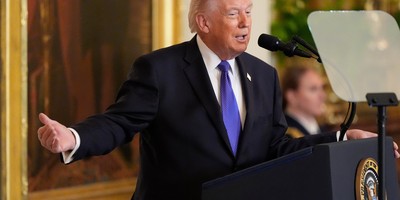
While President Obama still enjoys healthy personal favorability ratings, the popularity of his agenda is lagging behind and falling fast. His out-of-control spending and policies which include a frightening expansion of government intervention in the private sector have resulted in recent polls showing Republicans being favored over Democrats on a number of issues, including the economy. The number of people who identify themselves as conservatives is now at the highest point in five years at 40 percent.
Dick Morris and Eileen McGann recently noted: "As it becomes clearer that the deficit caused by spending has landed us in a new economic crisis, entirely of Obama's own making, his popularity and job performance are likely to drop as well. The old recession, which the public says Bush caused, shows signs of winding down. But the new recession and/or inflation, which Obama's massive deficits triggered, is just now coming upon us."
Americans have now gotten a taste of Obamanomics and so far they are not liking it. Additional goals of the administration, such as health care reform, are now being introduced. In his health care speech this week Obama called those opposed to his plan naysayers who are "not telling the truth." Obama denies their claims that he is proposing government-run health care.
Also not true, according to Vice President Joe Biden, are claims that the administration wants to tax health care benefits. This weekend on Meet the Press, David Gregory asked Biden about the possibility of raising taxes to pay for health care reform, specifically asking if the president would "sign a bill that taxes health care benefits for employees." Biden responded, "We made it clear we do not think that is the way to go. We think that is the wrong way to finance this legislation." But when pressed by Gregory and asked if that means the president wouldn't sign it, Biden replied, "I didn't say that... We'll have to see what the whole bill says. But we made it clear we do not believe you should be taxing, taxing the benefits that people receive through their employers now."
So the administration does not want to take the unpopular position of taxing employee health care benefits, but would consider signing a bill including such a provision. This is not an unfamiliar strategy for Obama. In his speeches he plays the moderate, reasonable man looking for the best way to address the crisis of the day. He accuses those who oppose him of playing politics, or being out of touch, or of being extreme, or of lying. At times, he even throws his political allies under the bus. By blaming the Democrat-led Congress in advance, in case he eventually signs an unpopular tax increase, he is doing just that.
In many ways the first months of the Obama administration resemble those of the Clinton administration. A man who was elected as a moderate (although in Obama's case that was a misperception) wins the White House with the promise of "hope" and "change." The economy was a big issue in both elections -- although in Clinton's case the economy was well into recovery. Both men promised middle class tax cuts. Both men reneged on that promise. Both men vastly overreached in their policy proposals and governed in a much more liberal fashion than acceptable to the majority of Americans.
Bill Clinton was not on the ballot in 1994, nor will Barack Obama be on the ballot in 2010. Barack Obama has blamed virtually all of the country's problems on George W. Bush, but now appears to be setting up the Congress as an additional target of blame. Bill Clinton's party lost big time in 1994 -- beyond "big time" actually. The result of the 1994 election was historic. If current trends continue Barack Obama's party may lose big time in 2010. That will especially be the case if Obama continues to set himself (and his personal approval) apart from those in his party.
Elected Democrats who want to return to Congress and remain in the majority read opinion polls. They can see that the number of Americans self identifying as conservative is rising. They can read the public opinion poll numbers for individual issues and policies, as well. They realize that Americans are not happy with the huge spending and excessive government control they are seeing now and are wary of future proposals.
Over the next year it will be interesting to see what Democrats in Congress do. Will they pass liberal legislation that gives President Obama what he could never publicly request, but would gladly sign? Or will they follow the polls and retreat from their leftward march? If the results of the legislation Congress passed and the President signed over the past few months proves to be bad enough, could it be possible that Democrats in Congress (especially those in "red" states) might even feel the need to run against Obama in the 2010 elections? Watch the opinion polls over the next six months and you should have the answer.

























Join the conversation as a VIP Member